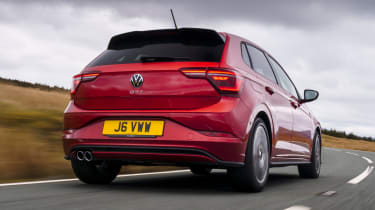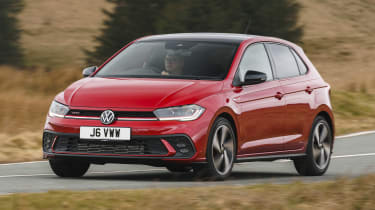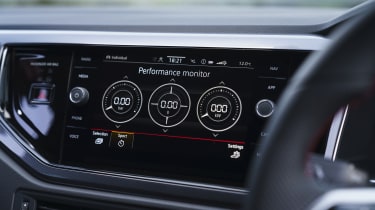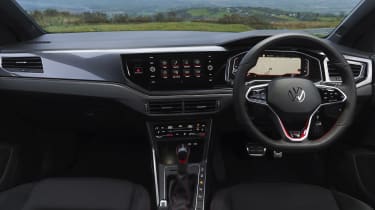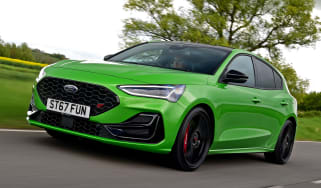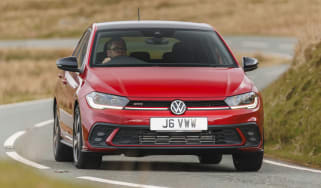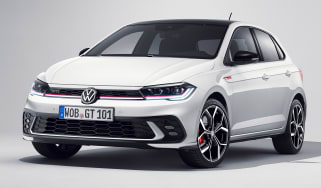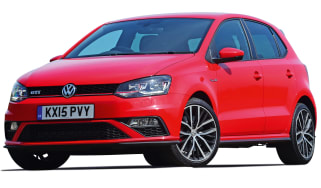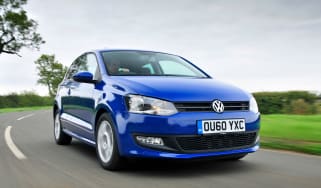Volkswagen Polo GTI hatchback review
“What it lacks in excitement, the Volkswagen Polo GTI makes up for with fantastic all-round appeal and a classy interior”
Pros
- Discreet and classy styling
- Competitive performance
- Very practical
Cons
- Slight drop in economy
- 18-inch alloys upset ride
- Not as exciting as top rivals
The Volkswagen Polo GTI has become an important part of the Polo range, and unusually it was launched at the same time as the regular model. That three-letter suffix has become synonymous with exciting hatchbacks that can also be comfortable, dependable and used on a daily basis.
When launched, the Polo was a direct rival for the likes of the Renault Clio RS, Peugeot 208 GTi and SEAT Ibiza Cupra, but ever-tightening emissions regulations mean small hot hatches are becoming less common. The list of rivals has shortened considerably as a result, although you might consider the Polo GTI against the Ford Fiesta ST, Hyundai i20 N, MINI Cooper S and perhaps the Suzuki Swift Sport.
 The 10 best hot hatchbacks to buy in 2025
The 10 best hot hatchbacks to buy in 2025
In line with the regular Polo range, the GTI was facelifted in late 2021. Look closely and you’ll notice a redesigned front bumper and grille, plus newly angled headlights with LED technology. Volkswagen has also fitted an electronic differential as standard, with the aim of tightening up the driving experience.
The Polo GTI bucks the engine ‘downsizing’ trend and features a 2.0-litre turbocharged petrol under the bonnet, matching the Golf GTI and even the Golf R in size. It’s detuned from those bigger cars to deliver 204bhp but it still matches the current crop of supermini hot hatchbacks and gets the Polo from 0-62mph in 6.5 seconds.
As is tradition, it also does this with a level of unflappable maturity some rivals struggle to match. It might not be as buzzy, responsive or direct as a Ford Fiesta ST or MINI Cooper S, but the Polo GTI majors on all-round ability. It’s a car you’ll be as happy to take on a motorway commute with as a fun Sunday blast.
More reviews
Fuel consumption is unsurprisingly higher than in a smaller-engined Polo but 41.5mpg and CO2 emissions of 154g/km aren’t awful for a car with the Polo’s performance and put it on par with most of its rivals. But, as with any hot hatchback, it may be too hard to resist squeezing the accelerator, which means the economy will tumble.
Thanks to a noticeable jump up in size, some prospective shoppers may wonder if they need a Golf-sized family car at all. A 69mm increase in width has given the Polo a much broader stance and improved space for passengers than the previous model. The boot has also seen a dramatic increase in capacity to 351 litres, which is not only impressive for a supermini, it trumps some cars from the class above. There are also three sets of ISOFIX child seat mounting points, as the front passenger seat is now child-seat compatible too.
In the standard GTI trim, the hot hatch theme is carried over from previous generations of fast VWs, with sturdy materials and plenty of creature comforts – this isn’t a stripped-out toy for the track. Tartan seats help the Polo to stand out, and body-coloured dashboard trim is a nice nod to past models. The facelift car also includes digital dials, as well as LED headlights and sat nav.
Volkswagen announced a special edition of the GTI, dubbed the GTI Edition 25, in mid-2023. This version celebrates the 25th anniversary of the Polo GTI, with extra equipment as standard and some special design tweaks to help it stand out from the lineup. It also gets an exclusive paint option on top of the standard GTI offerings. The special Edition 25 will be limited to 350 units in the UK (2,500 worldwide), with a plaque on the sill to highlight its rarity. The GTI Edition 25 is available to order from early August while stocks last, and could appeal to you if you’re a big Polo GTI aficionado, costing around £31,000 compared to the standard GTI’s £29,000 price tag.
Reliability issues shouldn’t crop up too often and a five-star safety score from Euro NCAP means safety is guaranteed. It’s also good to see autonomous emergency braking (with pedestrian detection) is fitted as standard.
MPG, running costs & CO2
Given the current climate around emissions, Volkswagen’s decision to make this latest GTI’s engine bigger comes as quite a surprise. But the manufacturer has clearly put a lot of effort into optimising its efficiency because fuel consumption isn’t noticeably worse than that of the 1.8-litre engine in the previous model. It’s worth noting that the figures look worse now, under the stricter WLTP test system, but they’re easier to replicate in the real world. With the standard DSG automatic gearbox, the GTI can return up to 41.5mpg and emits 154g/km of CO2 depending on the size of the alloy wheels fitted. Its numbers are also almost identical to the Fiesta ST, which manages 38.9mpg and 151g/km, while the MINI Cooper S can return 44.8mpg with an automatic gearbox fitted.
Road tax is charged at the standard rate per year but the Polo GTI is no longer such an affordable choice for company-car drivers. Its WLTP-tested CO2 emissions figure puts it very close to the top of the Benefit-in-Kind bands bandings, making it an expensive choice for fleet drivers.
Servicing should also be reasonable, thanks to the Polo sharing many of its parts with affordable superminis, and servicing plans will be available to help spread the cost of maintenance. Over a longer period, Polo GTIs tend to hold on to more of their value than many hot hatchbacks, which can help bring down the overall cost of ownership.
Engines, drive & performance
Sitting 15mm lower than a standard Polo and with firmer suspension and wider tyres, the GTI certainly isn’t short on grip. And as we’ve come to expect from Volkswagen performance models, it majors on confidence-inspiring stability rather than edgy handling. If you're after the most exciting cars to drive in this class, you'll be better off looking at the Hyundai i20 N, Ford Fiesta ST and MINI Cooper S.
With a much wider stance than before, the Polo feels more like driving a Golf Mk7.5 than ever, and its engine is similarly grown-up. In fact, the front wheels can sometimes struggle to deploy all its power on the way out of slow corners, so where a proper limited-slip differential could have helped, an electronic system called XDS instead steps in to restore order between the tyres and tarmac. A further grumble is the steering, which doesn’t offer much feel when you're driving, making it tricky to judge the GTI’s grip reserves in fast corners.
An optional Sport Select Chassis allows you to choose your preferred suspension setting, and in its firmest mode the Polo feels even more precise and rewarding to drive. Even in Normal, though, the ride is still quite firm.
After first shrinking to 1.4 litres and then bouncing back to 1.8 litres, the Polo GTI’s engine is now a turbocharged 2.0-litre – it’s a lower-powered version of the engine from the Volkswagen Golf GTI, its big brother. This bucks the trend of most manufacturers, who've made engines smaller over the past few years to boost fuel economy and reduce emissions.
With 204bhp, its 2.0-litre isn’t as highly tuned as the substantially more expensive Golf, but almost exactly matches the Ford Fiesta ST, which has a 1.5-litre three-cylinder engine. Both cars hit 0-62mph in just 6.5 seconds.
There’s no doubting the GTI’s grunt at low revs and in the mid-range, but it fails to reach an exciting crescendo, with power quickly tailing off instead. This makes it very brisk, but perhaps not as exciting as you might hope. Selecting Sport mode makes the seven-speed automatic DSG gearbox hold onto gears for longer.
Interior & comfort
We’ve praised the standard Polo’s interior and the GTI trim is just as impressive, even bearing in mind its higher price. The most obvious difference is a set of ‘Clark’ tartan cloth sports seats, which offer plenty of support, without being too firm and uncomfortable. The GTI also gets a sports steering wheel with red stitching and gearshift paddles. The rooflining is black instead of grey, ambient lighting adds character to the interior at night and there’s a unique gearlever.
Shared with the rest of the Polo range, the GTI has an eight-inch touchscreen infotainment system, with sat nav, Apple CarPlay and Android Auto. Build quality is impressive and the dashboard is now angled towards the driver for a sportier feel.
Other standard equipment includes VW’s Digital Cockpit instrument cluster, two-zone climate control and a host of driver aids such as adaptive cruise control, lane-keeping assistance and automatic city braking. Illuminated ventilation grilles also joined the equipment list for the facelift. Despite this, there are still plenty of options, including heated seats, a reversing camera, wireless phone charging and a sunroof.
A special commemorative Edition 25 model of the GTI was announced in May 2023 with additional standard equipment and design tweaks celebrating the 25th anniversary of the Polo GTI. Among these enhancements are uprated sports suspension as standard, an electronic differential lock and LED Matrix headlights, plus unique 18-inch alloy wheels – finished in the same Black Gloss as the roof and exterior mirrors. There are also premium leather sports seats with GTI motifs, and a sill panel trim reading ‘One of 2,500’ to remind owners of its exclusivity. Unique to the Edition 25 is also an Ascot Grey paint colour which can be chosen alongside the standard GTI colours.
There’s a sense of quality that goes hand-in-hand with the mature way the Polo GTI drives, and gives it a unique appeal among supermini hot hatchbacks. There’s no reduction in sound deadening, torn-out back seats or racing harnesses, so the GTI remains a good motorway car, as well as a fun one on a twisting B-road. It feels more like a Golf than ever, and the ride is pliant for a hot hatchback, with most bumps that do reach the interior down to the 18-inch wheels and low-profile tyres.
Practicality & boot space
The Polo is a much bigger car than it used to be, having enjoyed a considerable growth spurt for its sixth generation. Now wider than a Mk4 Golf and with a longer distance between its front and rear wheels, this is truly a supermini a family could live with happily. This is helped by the fact it comes with five doors as standard, making the back seats more usable for passengers or a child seat. There’s 15mm extra headroom in the front and a 21mm increase in the back, while shoulder room has also improved markedly.
Boot space is significantly better as well, increasing from 280 to 351 litres, which is the same as standard versions and not too much smaller than the Golf GTI’s 380 litres. It’s simply on another level compared with the 211-litre boot in the three-door MINI Cooper S, while the hardly small 311 litres of the Fiesta ST is also beaten.
Reliability & safety
Volkswagen’s latest supermini underpinnings are shared between the Polo, Ibiza and Fabia, and we’ve not heard of too many issues. Similarly, VW has produced 2.0-litre performance engines with over 300bhp with few major reliability problems, so the Polo GTI’s engine should be relatively unstressed. The Polo came 51st place on our Driver Power list of the top 75 cars on sale in 2022, but 69th in terms of reliability. A fifth of all VW owners reported a fault in the first year in last year’s survey.
Safety is a major selling point, thanks to the Polo’s impressive five-star rating from Euro NCAP, along with a 96% score for adult occupant protection. Its high rating was partly thanks to standard autonomous emergency braking with pedestrian detection, applying the brakes automatically if you fail to do so. For the first time on a Polo, blind-spot monitoring and rear cross-traffic alert are offered.
